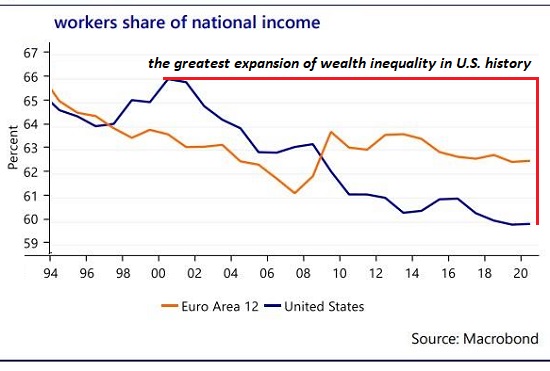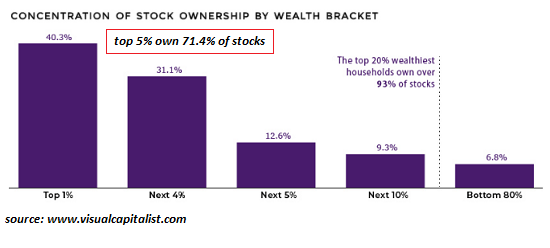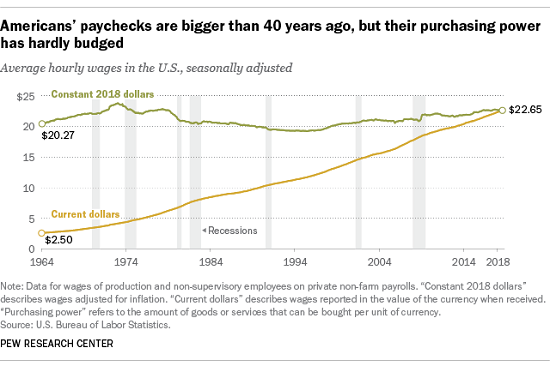The real heresy here is the American economy is now rigged for downward mobility.
In the conventional narrative, one’s economic class is overshadowed by one’s political belief structure: liberal, conservative, libertarian, etc. In terms of economic class, the conventional narrative divides people into their ideological beliefs about economic ideologies: free market capitalism, socialism, etc.
Economic class is one of the few remaining heresies in America: in the conventional narrative, it doesn’t exist or is meaningless due to the tremendous social mobility of the American populace: the working class stiff is one wise decision way from middle class status, and the middle class worker is one wise investment away from becoming wealthy.
What the conventional narrative purposefully ignores is the potential for downward mobility, in which one bad decision or investment triggers a drop in economic class and future financial prospects. I’ve been writing for years about the diminishing number of slots in America’s upper middle class, and the realities of diminishing social mobility has been documented by research.
As the recent college admissions scandal has highlighted, those already in the upper middle class have privileges such as alumni preference denied the lower classes. Those who already own assets have profited immensely from the credit-bubble economy while those without assets have been priced out and squeezed by relentless increases in rent, healthcare, childcare etc.
The heresy I’m proposing here is one’s economic class matters more than one’s purported ideological or political beliefs. The second half of my heretical proposal is that one’s political leanings divide very neatly along a single fault line:
Are your economic-financial prospects brightening or diminishing? Put another way: are you more likely to experience downward mobility (the reality for most in the bottom 90% and even many in the top 10%) or the conventionally expected upward mobility?
Those who recognize their precarious hold on their current economic class and the increasing risks of downward mobility are the infamous “deplorables”, those who are voting for non-mainstream candidates left and right, voting for national interests over globalization and so on.
The slippery slope from upper middle class to lower middle class is greased by the neoliberal boom-bust nature of the global economy: buy at the top and be forced to liquidate at the bottom and the entire household’s wealth can be wiped out.
| When a two-earner household that counts on two high incomes is downsized to one good income and one precariat income–low wage, unpredictable hours, no benefits– the sharp decline in income triggers a cascading decline of security.
In a credit-bubble boom-bust economy, everyone must become a brilliant, savvy trader/gambler or they risk losing it all. This is true not just of investment decisions but of career decisions, decisions to buy or sell a home, decisions to move to another region, decisions to have a child and so on.
As a general rule, the top 20% support the status quo because the status quo works well for them: they own assets, they feel secure in their jobs, and they feel they are upwardly mobile. |
Workers Share of National Income 1994-2020 - Click to enlarge |
| Interestingly, wealth and income don’t matter as much as we suppose. Those with high incomes and substantial wealth who feel vulnerable to downward mobility are much more critical of the status quo and more likely to vote along “deplorable” lines for outsider candidates.
The real heresy here is the American economy is now rigged for downward mobility, which fuels the rise of the “deplorables” who recognize downward mobility is the real new normal. Only the protected class with secure jobs support the status quo without question, but as the recession takes hold and deepens, and the credit-bubble bursts and assets decline rather than loft ever higher, the percentage of the populace who awaken to the precariousness of their economic class status will soar. |
Concentration of Stock Ownership by Wealth Bracket - Click to enlarge |
| The greatest sin in America is to recognize downward mobility is now like gravity: the upper-middle class household that loses a high-paying job and places the wrong bet in the credit-bubble casino is one slippery step from becoming a “deplorable.”
This dissolution of conventional ideological loyalties terrifies the ruling elites, for it threatens to dissolve their control of the masses. When the SillyCon Valley engineer gets laid off and loses the illusion of upward mobility, when the government worker who was promised a generous pension and bennies discovers that the bankrupt local government can no longer pay what was promised, the ranks of the “deplorables” will swell with self-reinforcing momentum. |
Average Hourly Wages in the U.S. 1964-2018 - Click to enlarge |
Full story here
Are you the author?
At readers' request, I've prepared a biography. I am not confident this is the right length or has the desired information; the whole project veers uncomfortably close to PR. On the other hand, who wants to read a boring bio? I am reminded of the "Peanuts" comic character Lucy, who once issued this terse biographical summary: "A man was born, he lived, he died." All undoubtedly true, but somewhat lacking in narrative.
Previous post
See more for 5.) Charles Hugh Smith
Next post
Tags:
newsletter
















